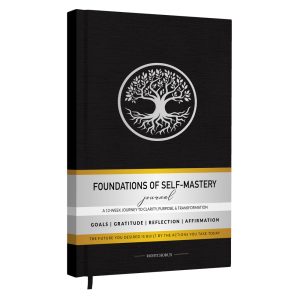A personal development journal is one of the most powerful tools for transforming your mindset and uncovering who you truly are.
Through guided self-reflection and intentional writing, a personal development journal helps you identify patterns, shift beliefs, process emotions, and set meaningful goals.
In today’s fast-paced world, carving out time for this kind of mindful clarity is more essential than ever.
If you’re someone striving for deeper self-awareness, lasting growth, and emotional balance, you’re in the right place.
This post will explore the life-changing effects of personal development journaling and how to incorporate it into your daily routine.
We’ll also introduce the Foundations of Self-Discovery Mastery Journal, a beautifully designed companion crafted to support your inner journey from reactive living to empowered transformation.
Foundations of Self Discovery & Mastery Journal: A 13-Week Personal Development Journal System
$29.95
The Foundations of Self Discovery…
Table of Contents
The Power of a Personal Development Journal for Self-Awareness
Personal development journals are catalysts for increased self-awareness and intentional living. One of the standout benefits is the ability to witness the stories we unconsciously tell ourselves.
When you make journaling a daily practice, you start to detect emotional triggers, repetitive habits, and limiting beliefs.
With this awareness, change becomes possible—because we cannot shift what we don’t recognize. A journal becomes your mirror, your mentor, and your memory keeper.
Another powerful aspect of journaling is accountability. By documenting intentions, actions, and progress, you create a running dialogue between who you are and who you’re becoming.
Plus, there’s genuine motivation in seeing how far you’ve come when you can literally look back and read your growth on the page.
Bullet Point Highlights:
- Sharpens emotional intelligence and introspection
- Tracks mental, emotional, and behavioral patterns
- Builds accountability through visible habit tracking
- Reinforces clarity in goals and core values
Benefits of Daily Journaling for Awareness
Daily journaling has been shown to increase emotional intelligence by helping individuals name, process, and understand their emotional experiences.
This habituates the practice of metacognition—thinking about thinking—which is vital for mindful living.
As you write, you begin identifying behavioral patterns and habitual thought loops that either support or sabotage your well-being.
With consistent use, your journal becomes a reflection of how you engage with the world.
You may notice cycles of stress, procrastination, or even joy and motivation that emerge under certain conditions. This observational power fosters a more empowered and less reactive life.
The Foundations of Self-Discovery Mastery Journal creates an optimal structure for this awareness work.
With dedicated sections for daily reflections, affirmations, and prompts like “What Went Well” and “What to Improve,” you’re gently guided into alignment with your values and goals.
How Journaling Builds Accountability
One of the lesser-talked-about strengths of a personal development journal is its role in creating personal accountability.
When your goals, wins, and missteps are recorded, they take on a tangible gravity. They’re no longer abstract ideas but real moments in your ongoing growth narrative.
Simple self-check-in prompts like “What barrier did I overcome today?” or “Did my actions align with my intention?” offer insight into progress without judgment.
Over time, these reflective inquiries foster internal responsibility, reduce the need for external validation, and celebrate every inch of forward motion.
The Foundations of Self-Discovery Mastery Journal incorporates a 13-week tracking system that celebrates wins while facilitating growth through bi-weekly progress reflections. If consistency is your struggle, this structure is your solution.
Foundations of Self Discovery & Mastery Journal: A 13-Week Personal Development Journal System
$29.95
The Foundations of Self Discovery…
Cultivating Emotional Intelligence Through a Personal Development Journal

One of the most transformative uses of a personal development journal is in strengthening emotional intelligence.
When we write about our inner world, we develop fluency in our emotional vocabulary, a deeper grasp of our interpersonal dynamics, and ultimately, increased compassion for ourselves and others.
This section explores how we move from reacting impulsively to responding with reflection and wisdom.
From Reactive to Reflective: Regulating Emotions
Expressive writing has proven benefits in regulating our emotions and deactivating stress-response systems in the brain.
When you’re overwhelmed or emotionally charged, journaling provides an outlet to explore and reframe your thoughts before they spiral into reactions.
The act of writing slows your nervous system, engages the logical brain, and helps create space between an emotional trigger and your response.
Phrases like “Given what I know now, how might I see this differently?” or “What would compassion suggest in this moment?” turn heated experiences into healing lessons.
Tools like the Foundations of Self-Discovery Mastery Journal provide daily quote-question-affirmation sections that naturally prompt this form of emotional reflection, helping you cultivate openness, non-reactivity, and grace.
Journaling Prompts That Foster Empathy and Connection
Empathy is a skill that flourishes when we intentionally cultivate it. Journaling offers a powerful gateway into seeing through someone else’s lens.
Start with questions like “What might this person be experiencing right now?” or “What values do we both care about, even if we express them differently?”
These prompts train the mind to assume positive intent, hold multiple perspectives, and respond from a place of understanding rather than defensiveness.
They build bridges between people and dissolve assumptions that easily arise during conflict.
The Foundations of Self-Discovery Mastery Journal explores these themes beautifully during its “Inner Peace” phase by prompting deeper relational awareness and identity clarity.
Foundations of Self Discovery & Mastery Journal: A 13-Week Personal Development Journal System
$29.95
The Foundations of Self Discovery…
Tracking Daily Habits and Growth in a Personal Development Journal
To create change, we must track change—and that’s where a personal development journal shines.
Whether you’re trying to implement new habits or simply become more mindful of your routines, journaling bridges the gap between intention and action.
This section dives into turning consistent micro-habits into meaningful macro shifts.
Turning Micro Habits into Macro Change
When personal growth feels daunting, start small. Habit stacking—linking a new habit to an existing one—is an evidence-based approach that works wonders.
By documenting these shifts in your journal, you begin noticing how tiny tweaks compound over time.
For example:
- Write your gratitudes right after brushing your teeth
- Stack your daily affirmation with your morning coffee
- Reflect on your day while your evening tea brews
- Pair vision journaling with weekly planning sessions
The Foundations of Self-Discovery Mastery Journal offers space for these rituals through structured morning and evening prompts, as well as habit and routine reviews. It becomes not just a journal, but a rhythm anchor.
Celebrating Progress, Not Perfection
Journals teach us to champion growth over perfection. Progress reflections like “How has my mindset evolved this week?” or “What discomfort did I lean into this month?” keep our attention on expansion rather than flaw-finding.
End-of-week or month reflections solidify learning. In these moments, don’t just highlight wins—record setbacks compassionately and the lessons they reveal. This builds resilience and inhibits all-or-nothing thinking.
The Foundations of Self-Discovery Mastery Journal integrates bi-weekly planning and milestone check-ins alongside gratitude rituals, so celebrating your evolution is part of the journey—not an afterthought.
Foundations of Self Discovery & Mastery Journal: A 13-Week Personal Development Journal System
$29.95
The Foundations of Self Discovery…
Manifestation and Vision Setting Using a Personal Development Journal

A personal development journal acts as a powerful space for vision-building and manifestation.
From writing future scenarios as if they’ve already happened to visualizing success through affirmations, journaling is a scientifically supported provider of both clarity and motivation.
This section explores how to write yourself into the life you envision.
Future-Self Journaling: Write First, Become Later
Future-self journaling involves writing from the perspective of the future you—the one who has already achieved the goal.
You might write, “I’m so proud of how confidently I spoke during the presentation today,” days before that event even takes place.
Why does this work? Our brains don’t entirely differentiate between imagination and reality.
This visualization technique creates neuro-pathways aligned with the person you’re aspiring to become. Repetition strengthens belief, and belief fuels behavior.
The Foundations of Self-Discovery Mastery Journal supports this practice through its “Tomorrow’s Next Step” prompt and forward-planning exercises like the Next 13-Week Vision Map and Letter to Future Self.
Crafting Vision Boards Through Words
A written vision board combines affirmations, visual journaling, and themed prompts to elevate goal clarity. Simple pages filled with hopeful phrases such as “I attract clarity,” “I live with integrity,” or “I create space for joy” visually reinforce your purpose.
You can also dedicate pages to bucket lists, annual goals, or symbolic storytelling that represents what you want to invite into your life.
Consider prompts like “What does your dream day look like one year from now?” or “What do I want to be known for?”
With dedicated space for a Gratitude Vision Board, the Foundations of Self-Discovery Mastery Journal bridges the power of narrative and aspiration.
Foundations of Self Discovery & Mastery Journal: A 13-Week Personal Development Journal System
$29.95
The Foundations of Self Discovery…
Journaling for Self-Discovery and Inner Clarity
Personal development journaling is ultimately about knowing yourself. When we slow down and get honest with our inner landscape, we uncover buried gifts, core values, and forgotten desires.
This chapter encourages radical self-honesty and clarity through intentional self-inquiry that leads to alignment.
Mirror Questions for Uncovering Core Values
Journaling is like holding a mirror to your soul. Mirror questions such as “What am I afraid to admit?” or “What parts of me crave more expression?” reveal essential truths.
These prompts gently remove the armor we’ve built to fit in and instead lead us back to who we are at our core.
Understanding core values helps you choose jobs, relationships, and missions that truly serve your highest self. It also gives you an internal compass when decisions feel overwhelming.
Return to these questions regularly—especially during transition seasons. Over time, you’ll notice how your answers evolve with your consciousness.
How the Right Journal Fosters Deeper Self-Inquiry
Journal quality matters. A thoughtfully structured journal makes self-exploration less intimidating and more impactful.
Layout, tone, and prompt depth all influence how deeply we can engage with ourselves.
The Foundations of Self-Discovery Mastery Journal was created to help you explore your identity, patterns, and purpose.
With 128 guided prompts organized across four growth phases—Rooted Awareness, Radical Self-Honesty, Inner Peace, and Inspired Reinvention—it becomes more than a journal; it becomes a trusted framework for navigating your evolution.
Foundations of Self Discovery & Mastery Journal: A 13-Week Personal Development Journal System
$29.95
The Foundations of Self Discovery…
How to Create a Ritual Around Your Personal Development Journal Practice

To gain the full benefits of a personal development journal, you must integrate it into a rhythm that feels sacred—not stressful.
By creating a ritual around reflection, journaling becomes an experience you look forward to instead of a task you check off. Let’s explore how to design a meaningful journaling habit.
Designing Time and Space for Reflection
Where and when you journal deeply influences the depth of your reflections. Morning and evening are both potent choice windows for introspection.
Enhance your space to welcome stillness and creativity.
Consider adding:
- A soothing playlist or ambient background music
- A cozy blanket or supportive pillow
- A calming beverage like herbal tea
- Candles, incense, or soft lighting
These accents signal your brain that it’s time to slow down, reflect, and grow. Journaling becomes less about the act and more about the energy you bring to it.
Building Consistency Through Intention, Not Pressure
Successful routines are born from flexibility and encouragement—not guilt. Set intentions for your journaling practice the way you would a new form of exercise or mindfulness.
Don’t aim for perfection. Aim for presence.
Remind yourself:
- Even 5 minutes of journaling can shift my mood
- Skipping a day doesn’t mean you’ve failed
- Every page is progress
- Your thoughts matter and deserve space
Sticking with a consistent yet compassionate journaling habit is made easier with tools like the Foundations of Self-Discovery Mastery Journal, which offers inviting entry points and structure without rigidity.
Conclusion
A personal development journal is far more than a notebook—it’s your springboard to a wiser, more courageous version of yourself.
Whether you’re navigating emotional healing, setting ambitious goals, or simply seeking clarity in daily life, journaling provides the structure and stillness to hear your own wisdom.
Pair this with tools like the Foundations of Self-Discovery Mastery Journal and you’ve got an encouraging guide on every step of your journey.
Growth doesn’t always look like massive leaps—it often looks like showing up with your journal day after day.
That’s where the transformation happens. One page. One prompt. One insight at a time.
Frequently Asked Questions
A personal development journal is designed to help individuals reflect on their thoughts, values, behaviors, and emotions. Its goal is to support your journey toward becoming more self-aware, emotionally balanced, and purpose-driven.
Start with simple prompts like “What are three things I want to improve about myself?” or “How did I feel today and why?” You can also use guided resources like the Foundations of Self-Discovery Mastery Journal to make the experience approachable and structured.
Consistency matters more than frequency. Daily journaling is ideal, even if only for five minutes. But writing once or twice a week can still be effective, as long as it becomes a consistent habit.
Yes. Reflective writing has been shown to modify thought patterns, improve emotional processing, and promote healthier behaviors. Over time, journaling helps rewire the brain through neuroplasticity, boosting emotional regulation and goal achievement.
The Foundations of Self-Discovery Mastery Journal is highly recommended. It includes expertly designed prompts for emotional awareness, habit formation, vision planning, and progressive self-reflection organized into distinct phases of growth.
Yes. A personal development journal focuses on intentional growth with structured prompts, emotional inquiry, and self-accountability. A regular diary may simply document events without deeper reflection or personal evolution in mind.
Digital apps can work for some, but handwriting helps anchor your reflections more deeply. The tactile experience of writing in a tool like the Foundations of Self-Discovery Mastery Journal often enhances focus and emotional integration.
Look for journals with: structured prompts, reflective exercises, space for long-form writing, and goal or habit-tracking. The Foundations of Self-Discovery Mastery Journal includes all these features along with a 13-week self-mastery framework.







